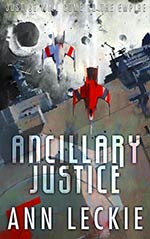
![]() Rabindranauth@DDR
Rabindranauth@DDR
8/21/2014
![]()
An interesting ride. Ancillary Justice is a book that slowly but steadily crept up on me. It took a bit of time to work it's magic, but there's no question that it does.
20 years ago, the Imperial Radch warship Justice of Toren was destroyed, taking everyone stationed on board with it. Everyone except Breq. Now Breq is cast adrift, the last surviving fragment of the ship's artificial intelligence with nothing but a thirst, for answers and for revenge on the Lord of the Radch herself, Anaander Mianaai.
Ancillary Justice has caused some pretty big waves since it was first released, and it's easy to see why. It's a complicated political tale that flips between the present day as Breq makes her way to Imperial Radch space to get her revenge, and a flashback 20 years previously that shows how Breq came to be in the first place. For a book that seems very much the space opera at first glance, it was a surprisingly fresh story, and one that provided a great read. But overall, I find myself a bit disappointed. For a book that created so much buzz, I honestly expected it to pack more of a punch.
To be fair, there's no denying Ann Leckie's written an excellent tale here. The first major point it has in its favor is the incredible depth of the characters. Considering the main character is the artificial intelligence of a spaceship, she does a top notch job of not only humanizing it, but making it very sympathetic to readers. At the same time there's no denying that Breq is not human, and never will be. It's a quintessential example of characterisation done wonderfully correct, and also sets high standards for the secondary characters in this tale, all of whom are people memorable and characters unto themselves.
And then there's the matter of her exploration of artificial intelligence. The AIs who are all part of Radch spaceships all seem to mimic the human mind to an amazing degree, and this actually leads to one of the biggest twists of the story. A twist that was the exact turning point of the book for me, the point I knew the buzz behind this book was going to deliver. Given the complexity of the human mind, with the various levels of consciousness and the way they all play a part in the overall operation of the mind, AIs with the complexity depicted in here were very easy to imagine as a possibility, and I think this was actually one of the biggest punches the book threw my way.
I love how the unfolding of the world was handled in here. Leckie slowly but steadily reveals necessary information about her world only as necessary, to shed new light on events as they occur or after, that perfectly address questions the reader may have. She does so in such a manner there was not a single point in this book I can recall a blatant info dump specifically occuring; instead she wonderfully manipulates your sense of curiosity, providing instant gratification to trick you into appreciating the worldbuilding, even if you find it boring.
However, there are some things about it that ultimately detracted from it for me.
The first is that the book was really overhyped. For a book so highly lauded, I at the very least expected a tale much more speculative in nature. Especially considering it somehow managed to defeat the entire Wheel of Time fandom to take the 2014 Hugo for Best Novel. Or should I just chalk that up to the social climate of the time? Time will tell, I guess.
And then there's the gender pronoun subversion the author does, which was incredibly poorly handled. The constant use of "she" to describe everyone made me feel like I'd stepped into a badly portrayed feminist statement. Did it feel realistic? No. There was absolutely no attempt to explain the complete lack of men in the story. Did it feel natural to the story she was telling? Far from it.
It was only after encountering multiple parts where a character is addressed as "he" in one instance and "she" in another, in a militaristic setting, that I understood the true gender of the character, and that all this time the author is actually using "she" as a gender neutral pronoun. The confusion that resulted from this poor depiction ultimately reduced my enjoyment of the book as a whole.
Finally there was the pace of the story. As interesting as the story is, it is a slow burn that steadily drags you behind it, and eventually, into it. For me, this led to a largely bored feeling for the first hundred pages or so; like I mentioned earlier, it was only when a revelation was made concerning the nature of the AIs I really became fully invested in the story.
From there, it steadily builds, as the moment I become invested also happens to be a key point in the story. When a tale is focused largely on political intrigue as this is, it has to be very well done, very tense to hook me, and whereas for the most part Ancillary Justice does deliver in this aspect, there were large swaths that just seemed to rehash events and information from the past that really broke up the tension for me.
Ultimately, I found Ancillary Justice a good read with interesting ideas that just didn't live up very well to the praise it's been receiving. It's easy to see why Ann Leckie caused so many waves with Ancillary Justice, but given I was promised a cranial explosion, I'm a bit disappointed to find my skull still very much intact. If you're into political intrigue tales or space stories that aren't about warring spaceships, this is definitely worth checking out.
http://drunkendragonreviews.wordpress.com/